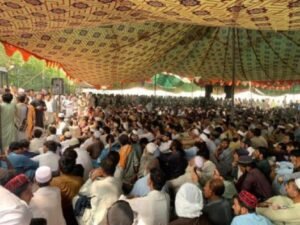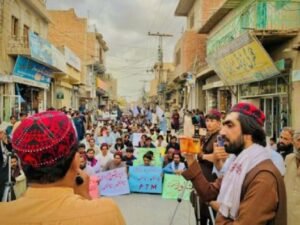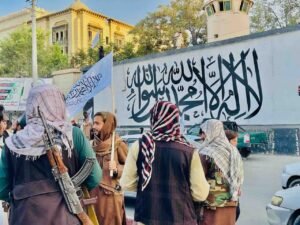Afghan Diaspora Protesters Slam the Taliban

By Ali Ahmad
On the 20th anniversary of 9/11, more than six hundred Afghan diaspora living in Austria gathered in front of the United Nations Headquarters in Vienna to protest the Taliban and its Pakistani supporters. The protestors condemned the interference of China, Iran, Pakistan, and the rest of the surrounding countries who support the Taliban. They also called on the UN and European countries to not recognize the Taliban as the legitimate government of Afghanistan.
The protestors were mainly sympathizers and supporters of Ahmad Massoud, a young pragmatic leader. Massoud fled to the Panjshir valley, approximately 80 km north of Kabul, to form the National Resistance Front (NRF) against the Taliban. The NRF was formed after the collapse of the Afghanistan government, which was then overtaken by the Taliban on the 15th of August. His father, Ahmad Shah Massoud, a former warlord, fought the Russians in the 1980s and then the Taliban from 1996 until he was killed in northern Afghanistan two days before the 9/11 terrorist attacks.
The Afghan diaspora angrily chanted “Azadi – Freedom”. Many of them were holding the placards with slogans stating, “Freedom”, “Sanction Pakistan!”, “Stop Afghan Genocide”, “Stop Pakistan Intervention in Afghanistan!” and “No to Taliban!” The protestors also demanded that the EU not embark on any diplomatic and economic deals with the Taliban. They held pictures of Ahmad Shah Massoud, the deceased anti-Taliban commander and his son, Ahmad Massoud, the founder of NRF. The Afghan protesters waved two former government flags: the US-supported government flag who held power until last month and the Mujahideen’s (warriors) regime’s flag who held in power until 1996.
Twenty years ago, the US government invaded Afghanistan to eliminate the Taliban, Al-Qaeda and other terrorist groups that were sheltered in Afghanistan for orchestrating the 9/11 attacks. On the 20th anniversary of those heinous attacks, the Taliban are back in power and highly esteem their relationships with Al-Qaeda and its offshoot groups. After failing to defeat the Taliban and international terrorist groups, the US and NATO pulled out all their troops from Afghanistan at the end of August 2021.
The Taliban’s takeover erased the 20 years of progress made in education, health care, telecommunication, media freedom and human rights protection. The Afghan women were one of the biggest beneficiaries of investments from the west in the last two decades. Now, that the Taliban are in power women are forced to live under a difficult and misogynist regime.
The Afghan diaspora have always accused the Pakistan’s military and intelligence agencies patronage to be the main institutions to have kept the Taliban insurgency alive since the U.S. ousted them from power in 2001. In a new research paper entitled, “Pakistan’s use of terror as a tool of statecraft”, Akhil Ramesh argues that many scholars studying the Afghan conflict have failed to acknowledge the role of Pakistan and other regional countries. The paper claims that not only have the intelligence and military agencies in Pakistan supported the Taliban, but a range of civilian sectors such as hospitals, madrassas, Pakistan’s influential diaspora, and several high-profile private sector leaders have provided the lifeline of support to the Taliban over the last two decades.
During the demonstration on Saturday, nearly half of the protesters were Afghan women who slammed the Taliban for denying women’s basic rights to work and education. The takeover of Afghanistan by the Taliban has put the lives of women in danger and has threatened their basic human rights. Upon taking power, the Taliban ministry of higher education has already ordered the segregation of male and female students in all universities. To ensure the safety of women, the Taliban have told the working women to stay home until a proper system is in place. Girls enrolled above the 6th grade and their female teachers have been told to stay at home until further notice.
“Women are to be stoned in Afghanistan. For the Taliban, women don’t exist. They don’t see us as human beings. There are no women’s rights in the eyes of the Taliban,” Sahar Hashimi, a female Afghan activist addressed the crowd in Vienna. “Where are international human rights? Where are international women’s rights? Why does no one hear us?” Hashimi asked the questions while facing the UN Headquarters in Vienna.
The Afghan diaspora ended the three-hour protest with an eight article declaration with the most important being the type of government desired, human rights and an inclusive government of all ethnicities. They demanded a republic system to govern Afghanistan, not an Islamic Emirate of Taliban; and an immediate halt to neighboring countries’ interferences including China, Iran and Pakistan into the affairs of Afghanistan. The Taliban government is a pre-dominantly Pashtun movement, but the protesters demanded an inclusive government from all ethnic groups living in Afghanistan. The protesters also called for equal rights and opportunities for Afghan men and women at all times. They demanded the protection of freedom of expression and called for an immediate end to the torture of journalists and media workers as the beating and slashing of journalists have been reported in recent days.
Ali Ahmad is a Vienna-based researcher focusing on migration and diaspora studies.
Note: The contents of the article are of sole responsibility of the author. Afghan Diaspora Network will not be responsible for any inaccurate or incorrect statement in the articles.





